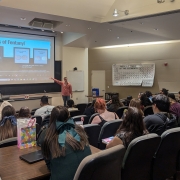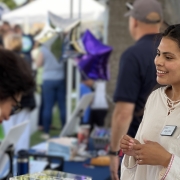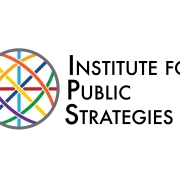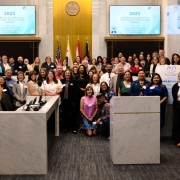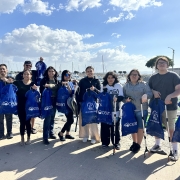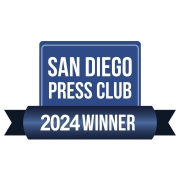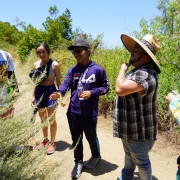The Institute for Public Strategies was awarded close to $1.5 million from two separate funders to enhance behavioral health literacy and promote help-seeking behavior among high school-aged youth in San Diego’s Border Region. The project will be conducted in collaboration with Welfie, a health equity-focused social enterprise dedicated to addressing youth mental and behavioral health.
This effort comes at a critical time as mental health challenges remain the leading cause of disability and adverse life outcomes among young people in the U.S., a situation further exacerbated by the COVID-19 pandemic. The funding comes from the Center for Wellness and Nutrition, a program of the Public Health Institute under contract with the California Department of Public Health to lead the Children and Youth Behavioral Health Initiative and Local-Level Public Education and Change Campaigns. Additionally, a generous grant from the Conrad Prebys Foundation of San Diego will help support the program.
“Youth are facing high rates of mental health issues. This project aims to foster a strong sense of belonging, crucial for their mental and behavioral health,” IPS CEO Brenda Simmons said. “By leveraging music, digital tools and social cohesion, we aim to support youth, their peers and adult allies.”
Prebys Foundation CEO Grant Oliphant said, “San Diego can become a national model by consistently supporting youth well-being.”
“The health and vitality of our youth are crucial for a vibrant future,” Oliphant said. “Our investment aims to ensure that San Diego’s young individuals are thriving and empowered to explore who they are and build meaningful community ties.”
Dr. Steven Moyo is a hospital doctor who is the founder and CEO of Welfie.
“Through our partnership with IPS, we’re poised to make a real difference, leveraging our expertise in community well-being and Welfie’s dedication to cultural health initiatives,” Dr. Moyo said. “This grant will help us jointly improve lives and break down health and education barriers in underserved areas, as we work together for more inclusive and resilient communities.”
The project will be centered around an innovative solution called “Vibes” and aims to enhance mental health literacy, reduce stigma and facilitate care navigation among youth. Vibes begins with a wellness selfie or Welfie, a mental health screening tool designed to assess an individual’s strengths and needs. Based on the results, users are presented with short, musical messages called Vibes, which utilize evidence-based strategies such as play, music therapy, positive affirmations, and storytelling to engage and educate youth about mental health.
“At a time when our youth are struggling, it’s imperative to meet them where they are and provide accessible support,” Dr. Moyo said. “Vibes represents a unique approach, leveraging technology and community engagement to empower youth and connect them with vital resources.”
The initiative prioritizes youth involvement through the Health Equity Response Organizer (HERO) Academy, a year-long, hands-on program where youth will co-create the app alongside mentors in the behavioral health and technology fields to ensure its relevance and effectiveness. Additionally, the HERO Academy aims to develop a skilled workforce of behavioral healthcare workers, according to Simmons. By amplifying youth voices and fostering leadership skills, Vibes aims to create a sustainable intervention that resonates with its target audience.
IPS has a longstanding commitment to community well-being, engaging directly with youth and families through evidence-based trainings, resource provision, and advocacy efforts. Additional funders and potential youth participants can get more information by contacting IPS by email at Welfie@publicstrategies.org.
“Through our partnership with IPS, we’re dedicated to breaking down barriers and creating inclusive, resilient communities,” Dr. Moyo said. “Together, we can make a real difference in the lives of San Diego youth.”
Welfie works alongside underserved communities, often through schools, to tackle health and mental health issues by co-creating deeply engaging, community-specific resources, programs, and tech tools that help families feel connected and engaged.
IPS works alongside communities to build power, challenge systems of inequity, protect health and improve quality of life. IPS has a vision for safe, secure, vibrant and healthy communities where everyone can thrive.
Contact:
Brittany Hunsinger
IPS Deputy Director

